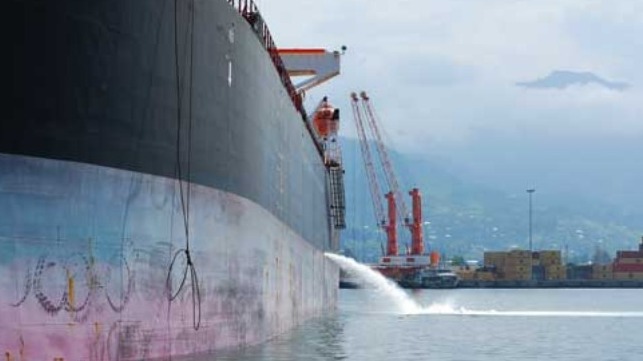Report: China is Checking Ballast Water on Japanese Ships for Radioactivity

China has reportedly quietly begun checking all ships arriving from Japan looking for signs of radioactivity in their ballast, while the state news agency reported today the country is beginning a one-year pilot program to stop invasive species. According to reports from Japan, this is the latest step in China’s concern about the release of contaminated water from the Fukushima nuclear power plant.
Japanese officials reported that they planned to release into the Pacific Ocean small amounts of the treated radioactive water that had been stored at the Fukushima nuclear power plant which was destroyed in the 2011 earthquake. Despite widespread protests, Japan proceeded with the release of the first batch of water in late August.
Japan’s Kyodo News reported last week that China has begun testing the ballast water aboard cargo ships arriving from Japan at some key ports. The news outlet speculated that it was likely for radiation level inspections, noting that China has called the waters being released in Japan "nuclear-contaminated" demanding the stop of the release. According to the news report, local Chinese authorities have notified operators of the vessels that they will ban them from releasing ballast water at Chinese ports if the radiation levels in their samples exceed a certain limit.
The Japanese report says the testing is taking place at ports in Tianjin, as well as Shandong Province in eastern China. The newspaper believes the testing began in July, which was after Japan announced its intention but before it confirmed the first release of the water from Fukushima.
The Chinese state news agency Xinhua issued the first statement acknowledging efforts to stop “invasive species” from entering China.
“China decided to begin a one-year action plan to prevent invasive alien species from entering border ports across the country as part of efforts to safeguard the country's biodiversity and ecological environment,” the report said while citing a large increase in the number of live animals and invasive plants stopped at border crossings.

that matters most
Get the latest maritime news delivered to your inbox daily.
Last month, China in addition to protesting Japan’s plan to release the water announced an immediate ban on the importation of seafood and fish from Japan. The announcement said the ban was effective immediately noting that China would “dynamically adjust relevant regulatory measures as appropriate to prevent the risks of nuclear-contaminated water discharge to the health and food safety of our country.”
China was reported to be importing more than $1.1 billion of seafood from Japan every year. Japan protested the ban and proposed setting up international monitoring insisting that the release of water from Fukushima would not impact the food supply.
